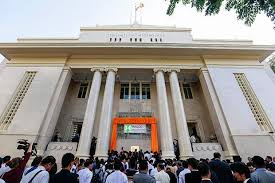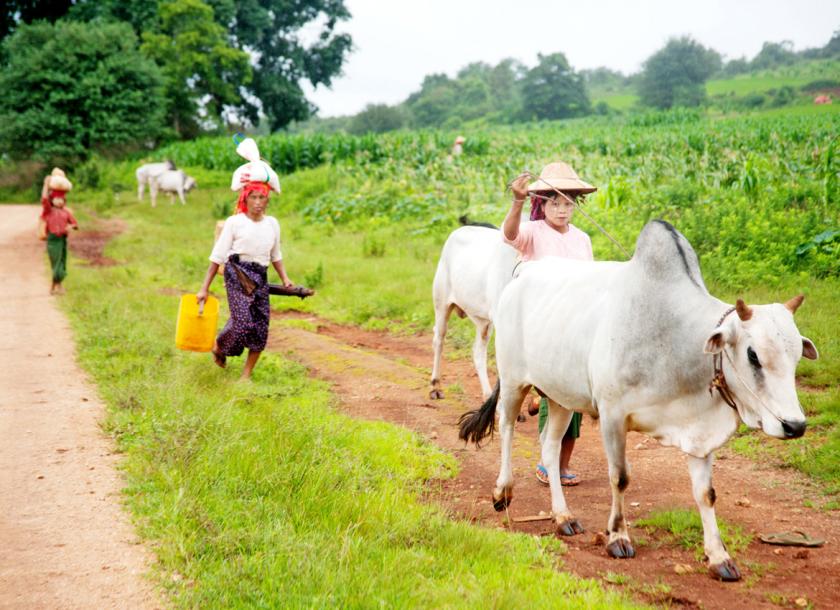![]() — Home — Business News
— Home — Business News
Weekly Business News from Myanmar
-
Government plans to become an agriculture-based industrial nation by providing loans worth 700 billion kyat for SMEs in agriculture, as well as construction and other sectors
Myanmar must become an agriculture-based industrial nation, said Union Minister For Planning and Finance Kyaw Win. The union minister made the comment at a recent meeting held in Nay Pyi Taw, the official capital of Myanmar. The meeting focused on financial businesses and technology management for development of small and medium enterprises (SMEs) that are important for the speedy economic development of the country. Kyaw Win said that local SMEs are currently weak in competency compared to rivals in neighbouring countries and are being encouraged by the government to export rather than import. -

In collaboration with International Finance Corporation (IFC), Myanmar regulators are benchmarking the corporate governance practices of Myanmar firms against international standards to promote improvements
IFC, a member of the World Bank Group, is working with Myanmar regulators to benchmark the corporate governance practices of Myanmar companies against international standards to help them improve performance, according to a statement. Numerous studies show that stronger governance helps companies operate more efficiently and manage risks better. In cooperation with the Securities and Exchange Commission of Myanmar (SECM), the Yangon Stock Exchange (YSX), and the Directorate of Investment and Company Administration (DICA), IFC is hosting a two-day workshop that began on the 16 January in Yangon for dozens of Myanmar companies to learn about the importance of corporate governance and best practices. At the workshop, IFC experts lead participants in evaluating the corporate governance practices of listed Myanmar companies as examples. The assessment is based on the Association of Southeast Asian Nations (ASEAN) Corporate Governance Scorecard – the regional benchmark of best practices; company performance is rated on various areas such as equitable treatment of shareholders, responsibilities of the board, and disclosure and transparency. -
To promote the garment sector and increase exports of the highest quality to the international market, the government and Myanmar Garment Entrepreneurs' Association set a 10 year strategy
Myanmar exported US$1.86 billion (2.51 trillion kyat) worth of products from garment factories operating under the “cut-make-pack” (CMP) system as of the first week of January in fiscal year 2017-2018, according to the Ministry of Commerce. The number represents a more than $568 million increase over exports for the same period last fiscal year, said Assistant Secretary Khin Maung Lwin of the ministry. The ministry has made garment exports their top priority and is working with the Myanmar Garment Entrepreneurs’ Association to set a 10-year strategy to promote the sector and increase exports of the highest quality garment products to the international market, said Aung Htoo, deputy minister for commerce. For over 20 years, Myanmar’s garment industry has been based on the CMP system. Efforts to shift more toward the higher value-added “free-on-board” (FOB) approach have not met with much success. -
Tanintharyi region authorities and locals are eager to welcome investment in electricity and any bid to boost access to electricity
PEOPLE’S thirst for electricity would create a lot of opportunities for investors to do business in Myanmar’s Tanintharyi region bordering Kanchanaburi Province. KyawKyaw Win, a small-scale food manufacturer living in Dawei, the capital of the region, said locals were eager to welcome any bid to boost access to electricity by the authorities as long as it could not harm the environment and their livelihoods. “A large number of SMEs [small and medium enterprises] here are struggling to survive because the rate of electricity tariff is much higher than that of other states and regions in Myanmar,” he said. To him, residents have to pay between 200 to 1,000 kyats per unit of electricity, depending on the area they live in, which is much higher than 35 kyats per unit in Yangon and many other regions. -

Despite higher economic growth projections by the government, trading on the Yangon Stock Exchange (YSX) has dipped
The Myanmar Stock Price Index hit an all-time low at the close of trading last week, closing the second week of the year at 450.14, down by almost 5 percent during the week. Over the period, only shares of Myanmar Thilawa SEZ Holdings (MTSH) were significantly traded. The company released its results for the six months to September 30, 2017 on December 29, reporting a 36 percent year-on-year rise in revenues amounting to K8.1 billion. Despite higher revenue, earnings were down 43pc year-on-year, to K6.2 billion, due to a lower share of profits from MTSH’s other investments. Investors are looking at more growth potential ahead, though. In its report, MTSH said new streams of revenue would come from the development of Phase 1, Zone B of the SEZ this year. Management said it is confident of achieving stronger growth from the sales of industrial plots across the 100 hectare area in the coming quarters. Trading on the Yangon Stock Exchange (YSX) dipped despite higher economic growth projections by the government, announced during the week. GDP growth in Myanmar is expected to hit 6.8pc for the 2017-18 fiscal year, President U Htin Kyaw said last Tuesday. -

Myanmar Investments International (MII) believes in the long term investment potential inherent in Myanmar
U Aung Htun, MD of Myanmar Investments International, discusses how investors should view Asia’s last frontier. U Aung Htun, managing director of London-listed Myanmar Investments International (MIL), believes in the long term investment potential inherent in Myanmar. “This is a market where every type of infrastructure needs to be improved. Power and transport are important as well as financial, medical and educational infrastructure. Trade facilities, interbank lending and liquidity in the stock market are all required to make things work,” he said. Topping U Aung Htun’s list of sectors with good potential for return on investments (ROI) is financial services and banking. Specifically, MIL is now eyeing opportunities to invest in insurance and corporate banking. Investment banking and securities trading as well as credit provision and mobile payments will take off, he said. -

Myanmar takes small steps towards providing greater liquidity for SMEs to increase business opportunities in Myanmar
A rising number of start-ups as well as small and medium enterprises (SMEs) are emerging in Myanmar as business opportunities rise. However, many companies fail to achieve their full potential and contribute substantially to the economy because capital assistance is lacking in the country. In Myanmar, banks require collateral in the form of property before they are able to extend loans to start-ups and SMEs which do not have a proven financial track record. While these measures are prudent for the banks, many promising businesses are not able to obtain the financing they need to grow, which, in turn, holds back further economic development. “Under the current economy, secured loans are necessary for financial prudence. But when a businessman wants to invest in his business and needs capital, he faces difficulties if he does not own properties he can use as collateral. For further economic development, we need to also allow unsecured loans,” said Dr Aung Thura, CEO of Thura Swiss, which provides consultancy services to the Yangon Stock Exchange. -

Thailand intends to retain border trade growth at 10-14 percent with Myanmar this year
Thailand’s border trade is expected to grow 10-14 percent this year from an estimated 1.6 trillion baht in 2017, driven by growing demand for Thai goods, underlining the importance of partnerships on trade and investment as well as working to improve trade with minor cities in neighbouring countries. Adul Chotinisakorn, deputy director–general of the Foreign Trade Department, said Thailand’s Young Entrepreneur Network Development Programme (YEN-D) is instrumental to border trade growth. Launched in 2015 to encourage Thai entrepreneurs to invest abroad and gain knowledge of the regional market as well as the trade and investment regulations of Thailand’s neighbours, the YEN-D programme features familiarisation trips and special training courses for young businesspeople in Cambodia, Laos, Myanmar, Vietnam and Thailand to help them better understand each other’s cultures and regulations. To be selected, Thai entrepreneurs have to be under 45 and come from business families. Governments in other participating countries have similar criteria. -

Myanmar will invest US$ 400 million on its first elevated expressway in Yangon, according to the signed advisory services agreement between the Ministry of Construction and International Finance Corporation (IFC)
The Ministry of Construction and International Finance Corporation (IFC) on January 11 signed an advisory services agreement to build an elevated expressway connecting Yangon port, Thilawa SEZ, Yangon International Airport, Yangon Industrial Zone and Yangon-Mandalay expressway. The 20.5-kilometre elevated expressway will cost US$400 million (535.86 billion kyat), with maintenance costs to be paid for by collecting taxes. According to the agreement, the IFC will be entitled be the leading advisory corporation for the project. The IFC said it would implement a tender selection process to choose an experienced and high-profile construction company with good management, diversified operations and high-quality maintenance capability. IFC said the project will help to develop the economy. “The big investment in basic infrastructure, especially in the transportation sector, is very important to develop the economy in the long term. That’s because it can promote a link between the economy and services in the social sector,” said Kyi Zaw Myint, deputy director general (planning) at the ministry. -

Multi-billion dollar coal-fired power plant project in Hpa-an is suspended due to protests, despite assurances of reliability from experts
Objections against a multi-billion dollar coal-fired power plant project in Hpa-An township, Kayin State, are mounting despite assurances of reliability from experts. The $3 billion plant is to be constructed by Toyo Thai Power Myanmar Co Ltd in Thone Eain village of Wutt Kyi Ward, Hpa-An township. The plant was originally slated for construction in Ye township, Mon State, but the project was cancelled amid protests from the local community. The 1,280-megawatt power plant will operate for 30 years with an option to extend for another 10 years, subject to approval. The plant, which is a joint venture between Thailand-based TTCL Public Co. Ltd and the Kayin State government, is awaiting parliamentary approval. Under the agreement, the company would have a 95 percent stake in the project while the state government would hold the remaining 5pc stake. “We are waiting for central government approval at the moment. After that we will start the Environmental and Social Impact assessment and feasibility study within four years from 2018,” said U Htet Aung Mon, project manager in charge of TTCL.
Business News
Copyright © 2014 Business Information Center All Rights Reserved.







